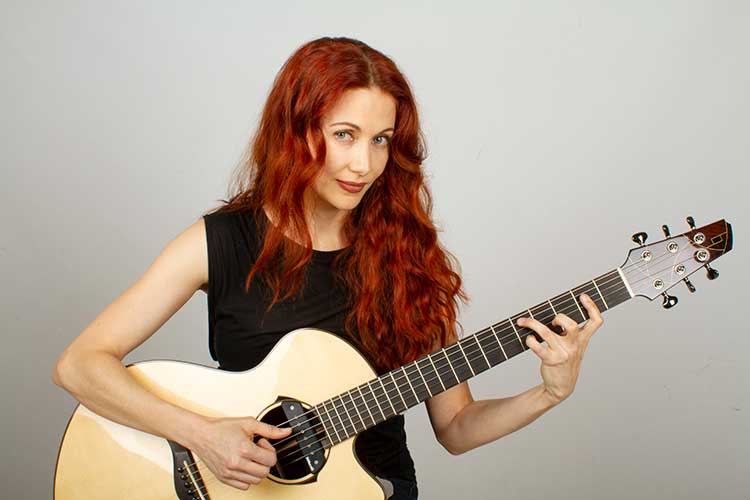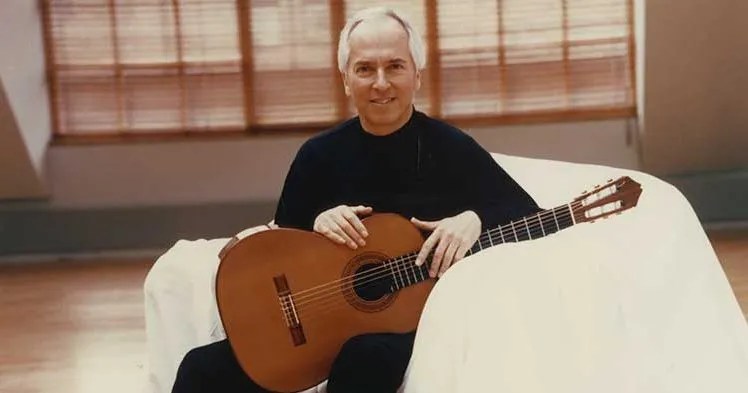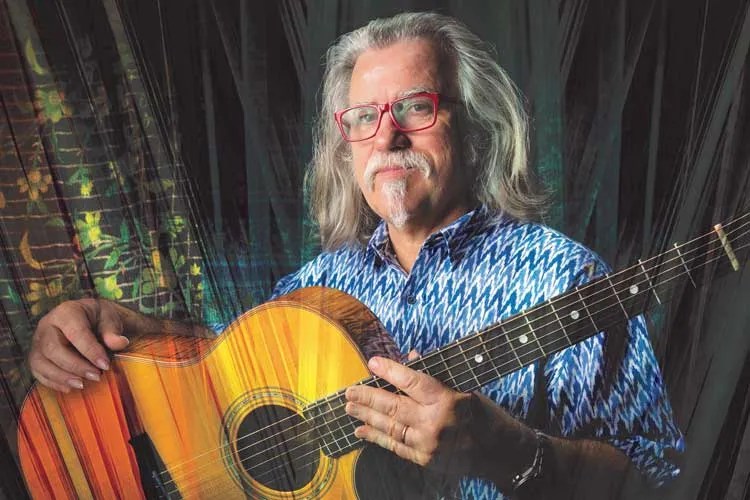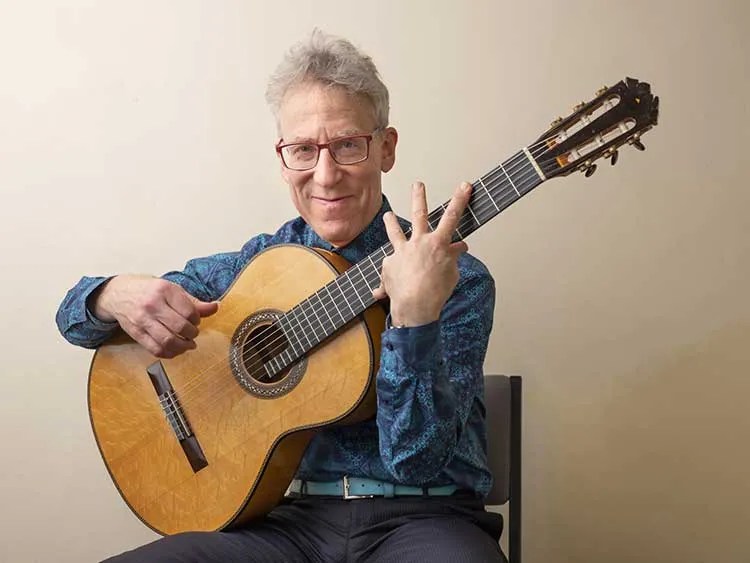Classical Guitar Phenom Jiji and Her Polystylistic Adventures
Jiji plops to the floor the moment she sees there are cats. Allowing them to approach at their own pace, she earns their immediate approval. She is swarmed with purrs and fluffiness as we sit in my apartment, talking about music, matcha, and the Steven Mackey guitar concerto that we are both scheduled to perform—Jiji with the Curtis Symphony Orchestra in March, and I with the Utah Symphony in April. I hand her the Kenny Hill classical that I currently have on loan. I have been dying to hear what a one-of-a-kind instrument sounds like in the hands of a one-of-a-kind musician. A few phrases, and the beauty of the tone, fluency, and effortlessness expressed in a mere handful of notes overwhelms any melancholy I might feel that I don’t sound like that at all.
Jiji’s playing reminds me that virtue and virtuoso share a common Latin derivation. Though in guitar circles, the term virtuosity may carry implicit associations with ostentatious displays of technical prowess, superfluous speed, and ego-driven musical one-upmanship, Jiji exerts her facility toward the highest artistic purpose: allowing music to be experienced in its fullest potential. Whether she is breathing fresh life into staples of the repertoire or introducing new pieces, her sensitivity allows the music to bloom in her hands.
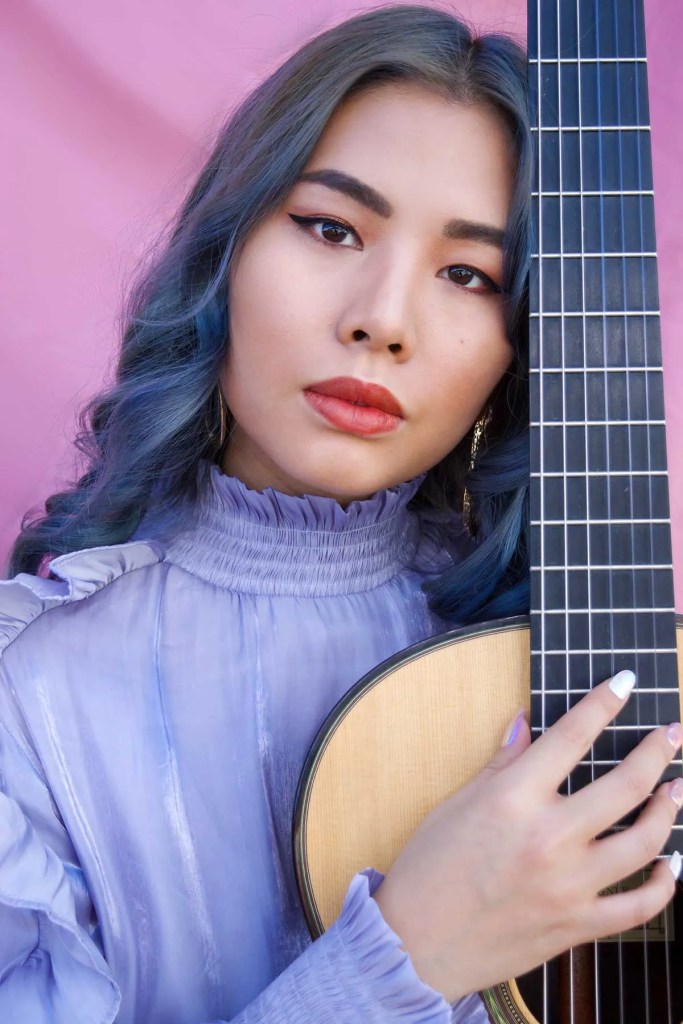
Jiji began studying classical guitar as a child in Seoul, South Korea, and ultimately continued her education in the U.S., earning degrees from the Curtis Institute of Music and Yale School of Music. Her interests extend beyond the classical guitar, as the 31-year-old artist embraces the spectrum of music, gracefully navigating and integrating worlds that seem at odds with each other. She performs concertos as a soloist with orchestras across the country, while listening to metalcore in the dressing room; sculpts otherworldly sounds with distortion and flangers on her Fender Stratocaster; is perfecting her two-handed tapping technique in preparation for the Mackey concerto—most of which is on electric guitar; and cites influences as diverse as pop, rock, and doom metal.
As both a composer and an advocate for her contemporaries, Jiji has premiered a variety of new works by modern artists across genres—three major concertos in just the past few years by composers Natalie Dietterich (light, beloved, 2018), Hilary Purrington (Harp of Nerves, 2019), and Krists Auznieks (Apvārsnis Kamolā, 2021). Jiji is a busy performer as well as a passionate educator, currently an associate professor of guitar at Indiana University Jacob’s School of Music. Her upcoming album, Unbound, set for release this year, is a collection of commissioned compositions.
Here, Jiji reflects on her diverse influences, shares practice techniques, and previews some upcoming projects.
When and why did you first pick up the guitar? Who were your teachers and mentors?
I started playing guitar when I was eight; I actually wanted to play the electric guitar. My parents bought DVDs of great artists for me to watch, including Eric Clapton, Deep Purple, Santana, the Assad family, and more. I asked for an electric guitar, and they said they would get me one after a year of classical guitar learning. They never bought me that electric guitar [laughs]! My first teacher, Cho-in, really helped me fall in love with the guitar. It was incredibly helpful in my early years of playing.
Jason Vieaux, a Grammy-winning artist, was the reason I moved to the United States. He taught me so much, and I am incredibly grateful. Professor Benjamin Verdery at Yale University also played a significant role in helping me find my own voice. I am still in touch with them; they are my mentors to this day.
ADVERTISEMENT
The worlds of classical and electric guitar are often quite separate. How do the two interact and overlap for you?
There was always this yearning to play to play the electric guitar, so I always had that world close to me. I have much appreciation for both worlds; I know they are very different, but I love music in all its forms. The sound of the electric guitar and all the effects inspire me a lot as a composer. I am always checking out the plug-ins and the pedals that other artists are using and how they use them to create cool sounds. This track I recorded [“Touch Him When (Heavy)”] was inspired by [drone metal band] Sunn O))) and Robert Fripp. Polystylism is so cool.
You have an interesting story about moving to the U.S.
I moved to Cleveland to study with Jason Vieaux at the Cleveland Institute of Music. However, I couldn’t live in the dorms because I was too young, around 15. So, because my parents couldn’t move to Cleveland, I had to get a legal guardian. I ended up finding one through Craigslist. In hindsight, that was not the best way to go, but it all worked out.
Have you dealt with obstacles or setbacks, and how did you navigate them?
Moving to the U.S., learning a new language, and experiencing cultural shock proved to be quite challenging. Trying to live on my own for the first time in a new country was very difficult. Navigating it all was quite a feat. I had to go through it; I didn’t fight it much. I think all these challenges made me a better person. Somebody told me growth is a painful process.
During my second year of the master’s degree program, I encountered a left-hand wrist injury. I wasn’t taking care of my body and practiced through the pain, a decision I now realize was wrong. With a big competition on the horizon, I practiced through it all. The injury still affects me to this day if I push myself too much. I am now extremely cautious, listening to any pain signals and taking shorter practice segments. It’s important to note that practicing should not resemble the movie Whiplash—that’s not a healthy approach for anyone.
Talk about your practice routine and how it has evolved. How do you currently divide and prioritize your time?
First, I figure out the left- and right-hand fingerings. I don’t start practicing until I have figured this out. Then, I plan out my priority group practice. Group A involves tasks that require the most time, like learning new pieces or anything that’s new. Group B is for refining pieces that are 60 to 80 percent done. Group C is dedicated to chamber music, sight-reading/technical workouts, and running through pieces.
ADVERTISEMENT
On a good day, I aim for three to four hours of practice, and I don’t play anything beyond that. I allocate 50 percent of my time to Group A, 35 percent to Group B, and 15 percent to Group C. Recognizing that you can’t finish everything in one day, consistent practice is the key to success.
You shared with me a technique for getting difficult passages up to speed. Would you describe it?
It’s called bracket practice. JV [Jason Vieaux] taught me this—I can’t take credit for it. Let’s say you have a 16th-note passage for two bars in common time. I’ll play the first three notes close to tempo, maybe a few clicks under. You aim to play them perfectly seven times in a row, with two to three seconds between the groupings, not like a continuous loop. Then, you add one more note, and so on, repeating the process. If you make a mistake, you start over the seven countdown [back to one]. Once you feel comfortable, you then start in the middle of the passage, like the sixth or seventh note. The key is that you play exact left- and right-hand fingerings and then you start a new bracket, repeating the process.

What are some of your strategies for preparing difficult music?
Trying not to panic, start by reading through the piece first. Identify the most challenging parts and follow these steps: 1) Work on fingerings; 2) implement bracket practice; and 3) refine every day. Don’t expect to play perfectly in one day. Patience is crucial, and don’t be afraid to throw in a few laughs and maybe some swearing during a practice session [laughs].
You draw from a wide array of styles and influences. Talk about some of the most important ones and how they have shaped you.
Pop music, electronica, and doom metal really inspire me as a composer. When I’m not performing, I write music that is influenced by that sound world. Writing music has been instrumental in my growth as a musician, and I find it incredibly helpful. DJing was a way for me to discover cool new music and explore. Although I haven’t done it in a while, I really want to get back into it.
The Steven Mackey concerto you’re playing at the Curtis Institute is a beast of a piece. What are the biggest challenges it presents, and how are you preparing?
ADVERTISEMENT
The biggest challenges were the new technical aspects of the piece. Being mostly a classical guitarist, tapping and looping were really foreign to me. It’s very, very different from what I’ve ever done. I’m just taking it day by day, practicing, and receiving great teaching from you, Gretchen! I love the challenge and learning new techniques.
You have done some wonderful collaborations with your husband, Gulli Björnsson.
The Seattle Symphony has commissioned a new piece by my husband, who is creating an audio-visual piece for me at their incredible venue, Octave 9. This is set for May 2025. I feel blessed to work with him; he’s truly one of my favorite composers. We perform together and create weird, fun music, exploring areas like virtual reality and digital art music.
What have been some career highlights so far? Anything you’re hoping to do in the future?
Getting an associate professor position at Jacobs School of Music, a role I hold dear alongside my colleagues Petar Jankovic and Daniel Duarte; winning Concert Artists Guild Competition’s first prize in 2016 (I can’t believe that was eight years ago!); and signing with Kirshbaum Associates management are my highlights.
ADVERTISEMENT
Artistically, I have premiered over 20 solo guitar pieces and three guitar concertos, which has always been my dream: to be working with living composers and premiering new works. I am super excited for my collaboration with R&B singer Daniel Fears, supported by the Austin Guitar Society, a totally new experience for me. Additionally, I have a new solo guitar piece written by one of my favorite composers in the whole wide world, David Lang, a Pulitzer winner, scheduled for April.
Looking ahead, I am excited about the possibility of continuing collaborations, be they classical or otherwise. While I admit that I don’t have everything figured out, and I am not entirely sure about my future plans, I am always down to explore the unknown and figure things out as I go.
What She Plays
Jiji plays a 2009 Gernot Wagner spruce double-top guitar (650mm) equipped with a Kremona piezo pickup, and prefers normal tension D’Addario Pro-Arté strings. In place of a traditional footstool, she uses a GuitarLift guitar support. —GM
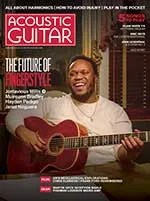
This article originally appeared in the May/June 2024 issue of Acoustic Guitar magazine.


